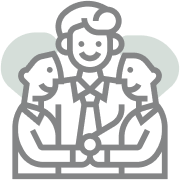The following topics will be covered during this bereavement and loss training course:
- Modern theories and models of grief
- Sudden or traumatic death
- The impact of Covid-19 on bereavement
- 'Normal' death happening during the pandemic
- When grief becomes 'complicated'
- Supporting others and caring for yourself during the pandemic
- Personal strategies for self-care when working with those who are bereaved
- External organisations and resources.
After attending this webinar, you will be able to:
- Meet the needs of bereaved people more effectively in your practice
- Describe key current models of loss and bereavement and consider how they can be applied in practice
- Reflect on the additional challenges that may arise when working with clients bereaved during a pandemic
- Maintain boundaries and self-care while working with bereaved people.
Learn from the experts
We work closely with researchers from King’s College London. Not only that, Maudsley Learning is part of the South London and Maudsley NHS Foundation Trust (SLaM) – the provider of the most extensive portfolio of mental health services in the UK. This means you’ll be receiving training from qualified professionals who have extensive experience in their chosen fields.
Advance your knowledge
Whether you’re a healthcare professional, psychologist or non-professional looking to learn more about the topic, you’ll be able to deepen your knowledge of bereavement and loss. You’ll learn about different theories and models of grief, plus ways you can support others – and yourself – who are experiencing grief.
Course schedule

Group bookings
Contact us for bulk booking discounts on group bookings of more than 5.

Bespoke courses
We are able to offer custom-made programs, whether digital or face to face, to meet the education and training needs of your organisation in the UK or internationally. We would welcome the opportunity to discuss your requirements and develop a proposal.

Research
Let our team complete a full Training Needs Analysis for a department, directorate, or the whole hospital! We can work to complete this ourselves or work collaboratively with your own staff. Our standard outcome measures assess learner progress and produce a full report looking at wider impact of training using a range of tested assessment methodologies.


